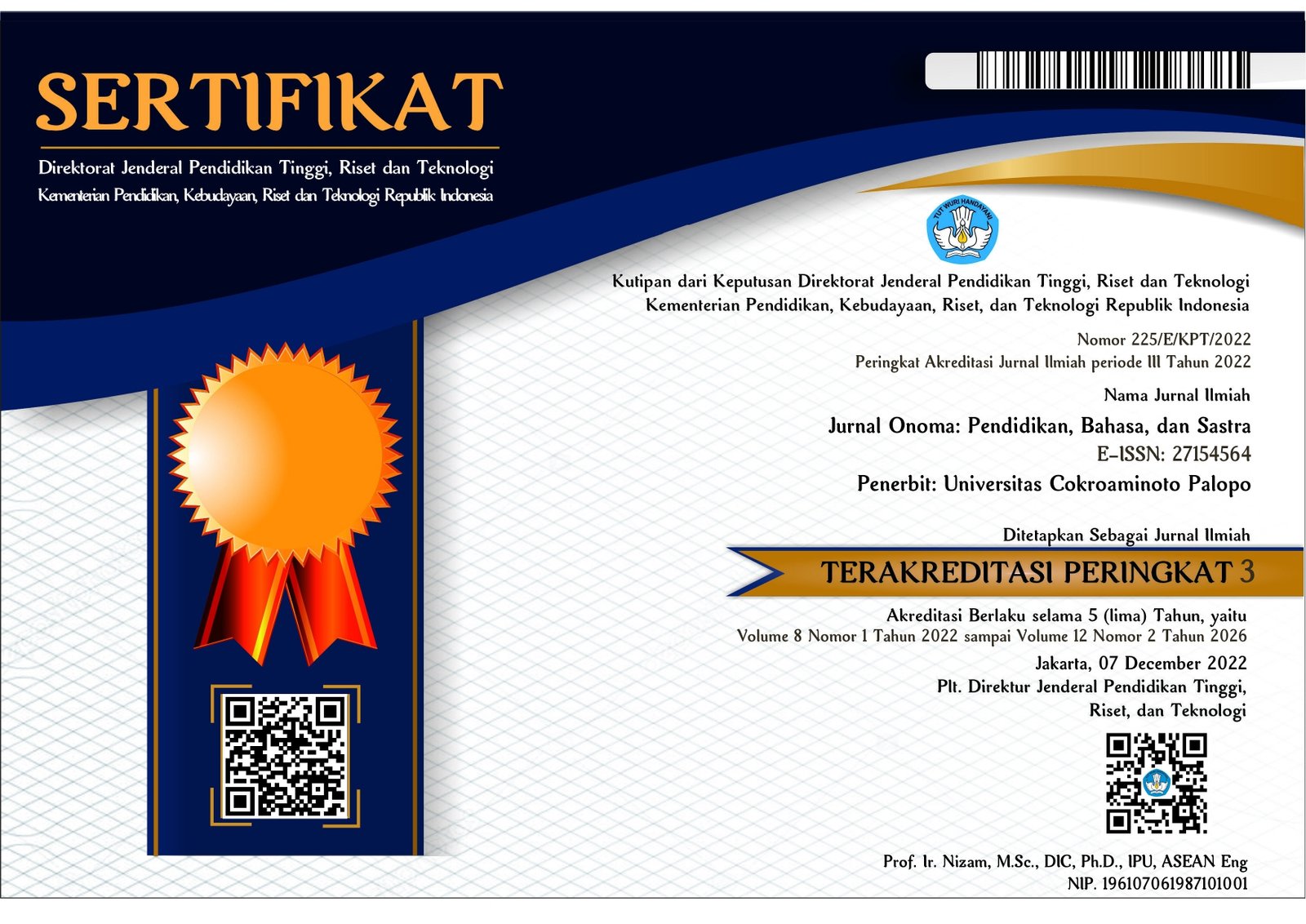Narasi Parenting Minato Kanae dalam Novel Penance
Indonesia
https://doi.org/10.30605/onoma.v8i1.1629
Keywords:
parenting, verbal violence, physical violence, educationAbstract
The aim of this study is to analyze the other side of parenting in Japan. Parenting is shown through two discourses, the influence of the family on the behavior and perceptions of children and differences in the living environment that can affect parenting patterns. Parenting discourse is expressed through qualitative research methods. The results obtained that parenting is not always applied well in family, for example the use of verbal and physical violence in moral teaching and demands for behavior. Meanwhile, differences in the living environment that affect parenting are shown through everyday life and the local community's perspective on education.
Downloads
References
Darmalaksana, Wahyudin. (2020). Metode Penelitian Kualitatif Studi Pustaka dan Studi Lapangan. Pre-print Digital Library: UIN Sunan Gunung Djati Bandung, 2020.
Holloway, S. D., Suzuki, S., Yamamoto, Y., & Behrens, K. Y. (2005). Parenting Self-Efficacy Among Japanese Mothers. Journal of Comparative Family Studies, 36(1), 61–76. doi:10.3138/jcfs.36.1.61
Hosokawa, Rikuya, and Katsura, Toshiki. (2020). The Relationship between Neighborhood Environment and Child Mental Health in Japanese Elementary School Students. International Journal of Environmental Research and Public Health 17, no. 15: 5491. https://doi.org/10.3390/ijerph17155491
James, Estelle and Benjamin, Gail. (1988). Public Policy and Private Education in Japan. London: Macmillan Press.
Knopf, J. W. (2006). Doing a Literature Review. PS: Political Science & Politics, 39(01), 127–132. doi:10.1017/s1049096506060264
Mariel, P., Sanko, N., & Vega-Bayo, A. (2021). The effect of the Free High School Tuition law on upper-secondary school choice in Japan. Studies in Educational Evaluation, 70, 101065. doi:10.1016/j.stueduc.2021.101065.
Minato, Kanae. (2012). 贖罪. Japan: Futabasha.
Minderop, A. (2010). Psikologi Sastra: Karya, Metode, Teori, dan Contoh Kasus. In Google Books. Retrieved from https://books.google.co.id/books?hl=id&lr=&id=J5FMDAAAQBAJ&oi=fnd&pg=PA1&dq=psikologi+sastra&ots=pQKy8pFT_l&sig=WLabcHJe7TFXnSMLMMbKIyaku3E&redir_esc=y#v=onepage&q=psikologi%20sastra&f=false
Mulyadi, B. (2014). Model Pendidikan Karakter Dalam Masyarakat Jepang. Izumi, 3 (1), 69-80. https://doi.org/10.14710/izumi.3.1.69-80.
Pradoko. Susilo A. M. (2017). Paradigma Metode Penelitian Kualitatif: Keilmuan Seni, Humaniora, dan Budaya. Yogyakarta: UNY Press.
Riyana, Cepi. (2008). Studi Perbandingan Kurikulum Cina, Korea, dan Jepang. Makalah Studi Perbandingan Kurikulum Prodi S3 Pengembangan Kurikulum Sekolah Pasca Sarjana Universitas Pendidikan Indonesia.
Semi, M. A. (2021). Metode Penelitian Sastra (Edisi Digital). Retrieved from https://ebooks.gramedia.com/id/buku/metode-penelitian-sastra
Solihin, Lianny. (2004). Tindakan Kekerasan Pada Anak dalam Keluarga. Jurnal Pendidikan Penabur, No.03, hal. 133.
Son, H., Lee, Y. A., Ahn, D. H., & Doan, S. N. (2017). Maternal understanding of child discipline and maltreatment in the United States, South Korea, and Japan. Children and Youth Services Review, 82, 444–454. doi:10.1016/j.childyouth.2017.10.
Tamura, T. (2018). Effect of Perceived Parent–Child Relationship in Childhood on Resilience in Japanese Youth. Psychological Reports, 003329411876250. doi:10.1177/0033294118762504
Downloads
Published
How to Cite
License
In submitting the manuscript to the journal, the authors certify that:
- They are authorized by their co-authors to enter into these arrangements.
- The work described has not been formally published before, except in the form of an abstract or as part of a published lecture, review, thesis, or overlay journal.
- That it is not under consideration for publication elsewhere,
- That its publication has been approved by all the author(s) and by the responsible authorities – tacitly or explicitly – of the institutes where the work has been carried out.
- They secure the right to reproduce any material that has already been published or copyrighted elsewhere.
- They agree to the following license and copyright agreement.
License and Copyright Agreement
Authors who publish with Onoma Journal: Education, Languages??, and Literature agree to the following terms:
- Authors retain copyright and grant the journal right of first publication with the work simultaneously licensed under Creative Commons Attribution License (CC BY 4.0) that allows others to share the work with an acknowledgment of the work's authorship and initial publication in this journal.
- Authors are able to enter into separate, additional contractual arrangements for the non-exclusive distribution of the journal's published version of the work (e.g., post it to an institutional repository or publish it in a book), with an acknowledgment of its initial publication in this journal.
- Authors are permitted and encouraged to post their work online (e.g., in institutional repositories or on their website) prior to and during the submission process, as it can lead to productive exchanges, as well as earlier and greater citation of published work.

















